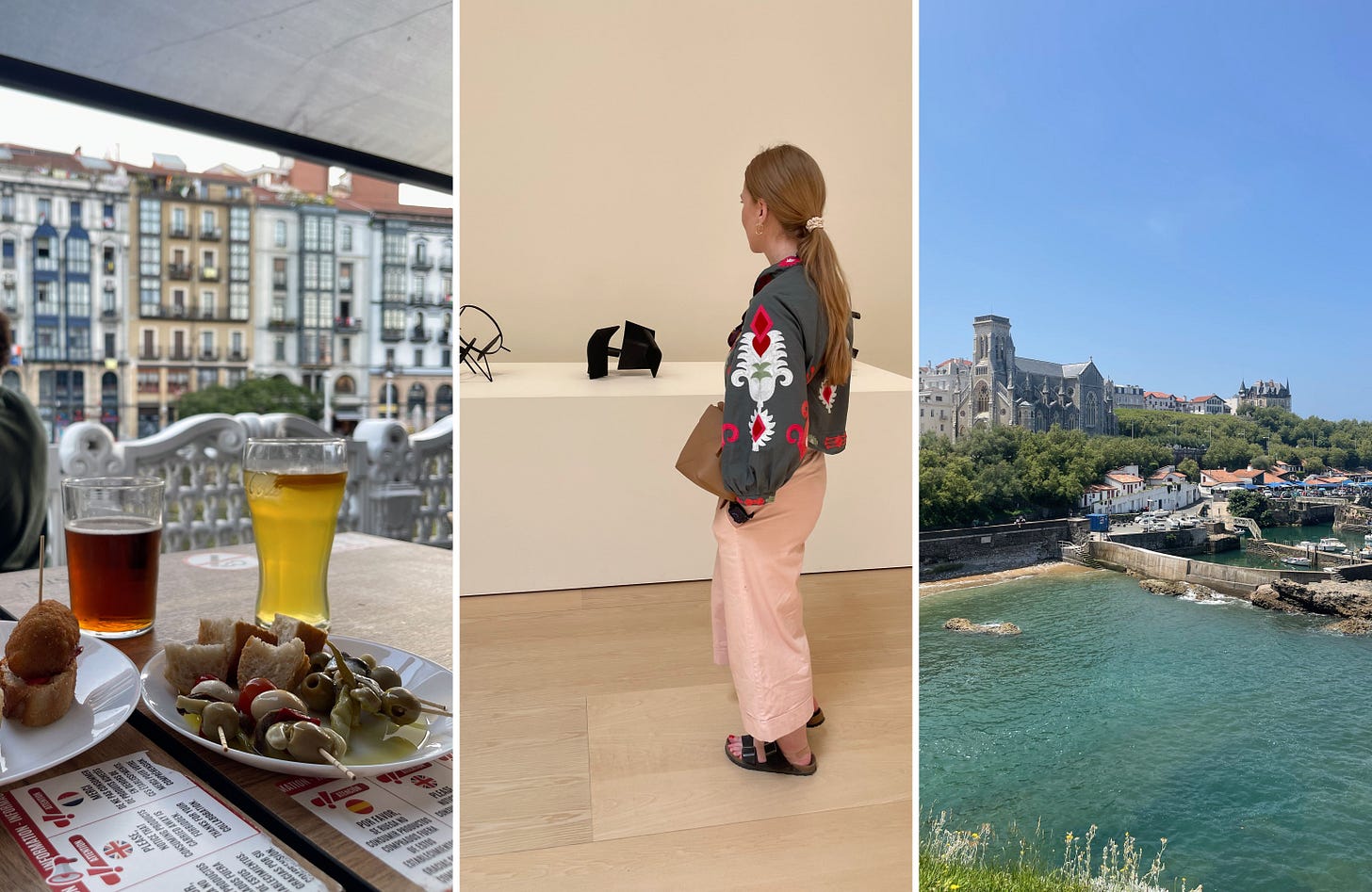Malala’s next chapter? Investing in women’s sports.
Plus, a few learnings from my Basque Country trip.
Your Monday, Wednesday, and Friday briefing on global affairs, human rights, environment, social innovation, business, culture, and design—offering fresh insights through the lenses of sustainable development, women-centered perspectives, and emerging global trends. The aim? To keep you informed, curious, and always ready with a compelling conversation starter at the dinner table.
In today’s letter: the most significant shift to British abortion law since 1967, more erosion of Hong Kong’s civil society, changes to UN climate negotiations are needed, the swimmable cities alliance, AI putting together your outfits, Thai-Cambodia border tensions, maybe the first gay bar at a US airport, Design Shanghai, and much more.
Hello from the other side of a 10-ish day holiday through Spain and the French Basque Country—during which I did not open my laptop once (!). I still read the usual mix of newspapers, magazines, and newsletters, though admittedly at a slower, more sun-drenched pace.
We began with three vibrant days in Madrid before picking up a rental car and heading north, weaving through Bilbao, San Sebastián, Pamplona, Saint-Jean-de-Luz, Biarritz, and Bayonne—each stop offering a different window into a landscape shaped by deep tradition and quiet resistance. The Basque region straddles the Spanish-French border, but it feels like its own world entirely defined by a fiercely preserved identity, a unique language (Euskara) with no known linguistic relatives, and a cuisine that feels both ancient and avant-garde.
We spent our days slipping in and out of medieval towns, tasting local specialities, and letting the layers of culture, architecture, and politics slowly unfold. While driving, we listened to The Basque History of the World, a compelling book that traces the lineage of Europe’s oldest surviving culture, from prehistoric cave dwellers to contemporary political movements. (Highly recommend if you're visiting.) The Basques have withstood Romans, Moors, and modern states, and somehow (miraculously) their language and traditions endure. It’s a region that rewards curiosity and attention.

A full WRW travel guide (and hopefully a vlog) is coming soon, but here are a few initial reflections:
Pintxos are perhaps the most delightful and efficient way to eat. Anchovy, olive, and guindilla peppers? Yes. Salted cod atop crusty bread? Absolutely. These one-bite masterpieces are meant to be sampled in succession, preferably while strolling from bar to bar. It’s a whole ritual.
The French side of the Basque region is—how do I say this without sounding dramatic—eyewateringly beautiful. I was told by more than one local that people try to keep it a secret. I understand why.
In Madrid, some of my favourite moments were the night walks through the city’s parks, so alive with people of all ages, simply being out in the world, sharing space.
The churros are dipped into mugs of hot chocolate so thick you could stand a spoon in them. This should be standard everywhere.
And if you’re in Madrid, do not skip the Palacio de Liria. It’s recently opened to the public and currently houses an extraordinary Joana Vasconcelos exhibit—40 of her works integrated into the rooms of the palace. It’s surreal, clever, and completely worth your time.
More soon, but for now, I’m back, a little sun-kissed, a little more rested, and excited for everything ahead.
At least 16 people were killed and more than 400 injured this week across Kenya, as a nationwide day of remembrance for victims of police violence descended into fresh chaos. The march—meant to honour over 60 people killed during last year’s protests against tax hikes—was met with force in cities like Nairobi, Mombasa, and Kisumu. Police blocked access to key buildings, fired rubber bullets and tear gas, and shut down live media coverage, while demonstrators lit fires and held placards with the names and faces of the dead. At the heart of the unrest is a generation facing joblessness, state corruption, and shrinking civic space.
In the most significant shift to British abortion law since 1967, MPs have voted to repeal a Victorian-era statute that criminalised women for ending late-term pregnancies. The amendment, led by Labour MP Tonia Antoniazzi and supported by major medical bodies, follows a string of prosecutions that brought renewed scrutiny to outdated laws. While the reform shields women from prosecution, criminal liability for medical professionals remains for late-term procedures, and a broader attempt to enshrine abortion as a human right failed to advance. The bill now moves to the House of Lords, marking a cautious but meaningful step toward decriminalisation. Meanwhile, across the Atlantic, yesterday marked three years since the United States lost federal abortion rights—a sombre anniversary still reverberating. Reproductive health reporter Shefali Luthra’s 93 Days: The Summer America Lost Roe v. Wade remains essential reading.
Nearly four years after the Taliban’s return to power, UN Women’s 2024 Afghanistan Gender Index paints a stark picture: nearly 80% of young Afghan women are excluded from education, employment, or training, and the country now ranks second-worst globally for gender equality. The Index reveals a 76% gender gap across health, education, financial access, and leadership, with girls’ school completion rates nearing zero and women’s labour force participation at just 24%. Yet even under mounting restrictions, Afghan women continue to show resilience—starting businesses, delivering aid, and quietly demanding a future where their inclusion is not optional, but essential.
“Afghanistan’s greatest resource is its women and girls. Their potential continues to be untapped, yet they persevere. Afghan women are supporting each other, running businesses, delivering humanitarian aid and speaking out against injustice. Their courage and leadership are reshaping their communities, even in the face of immense restrictions. We must stand with them in their pursuit of a country that reflects their rights and the aspirations of all Afghans.” - UN Women Executive Director Sima Bahous.
The closure of China Labor Bulletin this week feels like another mile marker in the steady erosion of Hong Kong’s civil society. For thirty years, the organisation, founded by Tiananmen Square activist Han Dongfang, tracked strikes and advocated for labour rights across mainland China. But under Beijing’s tightening grip, the space for rights advocacy has narrowed almost completely, and the pressures (financial, political, and existential) have become too great. These are the losses we measure not in headlines, but in the slow silencing of voices that once held power to account.
In a Dallas ballroom filled with ruffled sundresses, cowboy boots, and anti-feminist slogans, some 3,000 young women gathered for Turning Point USA’s Young Women’s Leadership Summit — though little leadership was actually on offer. Speakers urged attendees to trade ambition for domesticity, promoting a vision of womanhood centred on faith, homemaking, and submission, wrapped in wellness mantras like “less Prozac, more protein” and “we’re done pretending a cubicle is more empowering than a countertop.” The summit reflects a growing “womanosphere” on the far right, where natural living, homemaking, and wellness converge with hardline conservative politics. Critics noted the irony of professional women encouraging other women to abandon careers, but for many in the room, success was reframed as a ring, children in the garden, and a well-stocked larder.
At the Bonn mid-year talks, more than 200 climate groups issued a collective call to fundamentally reform how UN climate negotiations are conducted. After decades of consensus-based decision-making (where a handful of powerful, fossil fuel-dependent nations can stall or weaken agreements), campaigners argue that the process itself has become a barrier to real climate action. Their demands include replacing consensus with voting, eliminating corporate sponsorships from polluting industries, ensuring that host countries meet stricter climate and human rights standards, and addressing systemic inequities, such as visa access for delegates from the Global South. Delivering true climate justice requires a complete rethinking of the system.
Malala’s next chapter? Investing in women’s sports. She has just launched Recess Capital with her husband, Asser Malik, and some notable advisors, including Billie Jean King, to fund initiatives ranging from youth programs to major leagues, such as the NWSL and WNBA. As always, her work is personal and visionary, rooted in memories of being kept off the cricket field as a girl, and driven by a belief that sports can unite communities and empower women. “It’s sending a powerful message to women, to all of us, that the sky’s the limit, and women’s sports will thrive,” she said. It’s the kind of bold, thoughtful move we love to see: one that blends equity, infrastructure, and inspiration.
In western Guatemala, a quiet hero named Armando López Pocol has been planting trees for over 25 years—turning scorched land into forests, building community, and standing up to extractive industries along the way. His reforestation project, Chico Mendes, named after the murdered Brazilian environmentalist, isn’t just about trees; it’s about livelihood, dignity, and hope. Fires have destroyed much of what he’s built, and he doesn’t get government support because of his politics. And yet, he keeps going. Volunteers come. Trees grow back. And his vision—a clean, green planet for the children—still feels worth fighting for.
Few things capture the quiet optimism of good urban design like this: in Berlin, nearly 200 people jumped into the Spree this week—not just to cool off, but to demand that their city reclaim its river. The Fluss Bad Berlin movement has been advocating for years to reopen the Spree for public swimming, joining cities like Paris, Vienna, and Basel, where urban rivers have become both climate refuges and symbols of equitable public space. It’s about more than swimming; it’s environmental justice for those who can’t flee the city when the heat arrives. The Swiss have long mastered this particular joy, as seen in the video below and this travel piece. At a global level, the Swimmable Cities alliance, which just hosted its first summit in partnership with the City of Rotterdam under the UN Decade on Ecosystem Restoration, is advancing the case for urban swimming as a tool for regeneration, resilience, and more livable cities.
Last month, United and JetBlue announced a new partnership—“Blue Sky”—offering shared mileage perks, reciprocal elite status, and limited slot swaps between the two airlines. While frequent flyers may welcome the benefits, Spirit Airlines is urging regulators to block the deal, arguing it’s anticompetitive and could set a precedent for deeper consolidation among major carriers. The debate underscores ongoing tensions in the U.S. aviation sector over market concentration and consumer choice. But arguably more concerning for travellers? The Chase Sapphire Reserve’s annual fee is climbing to $795.
Chicago’s iconic Sidetrack, long considered the city’s largest and most beloved gay bar, has applied to open a location inside O’Hare Airport. If approved, it would become the first gay bar in a U.S. airport—a milestone not just for visibility, but for integrating LGBTQ+ spaces into everyday public life. This would be FABULOUS.
Tensions along the Thai-Cambodian border are escalating. Thailand has tightened land crossings, allowing only students, patients, and essential travellers, effectively blocking thousands of tourists. The dispute follows a fatal border clash last month, prompting Cambodia to boycott Thai films, produce, and fuel, while Thailand targets cross-border scam operations. Diplomatic efforts have stalled, especially after a leaked call between Thai Prime Minister Paetongtarn Shinawatra and former Cambodian leader Hun Sen drew domestic criticism. As pressure mounts, Bangkok’s government is now reshuffling its cabinet in an effort to stabilise both the political fallout and regional relations.
I love my digital wardrobe app (hi, Indyx!), but AI creating my outfits? Absolutely not. That is now an option with Jenny Wang’s Alta, a new AI stylist app that just raised $11 million with backing from LVMH, CFDA, and Michelle Obama’s stylist. The app allows users to upload their closet, experiment with outfits, and even mix digital try-ons with planned purchases. The concept draws comparisons to the iconic Clueless closet, with Wang positioning Alta as part of a new generation of consumer AI platforms that prioritise personalisation and cultural relevance.

I’ve been watching Farm Rio’s behind-the-scenes posts from Reweaving Amazonia, which opens this week at Coal Drops Yard for London Climate Action Week. The exhibition brings together Amazonian designers, Indigenous makers, and diasporic creatives working at the intersection of sustainability, craftsmanship, and cultural preservation. It’s exactly the kind of thoughtful, globally rooted design conversation we love here at We, Renaissance Women—where beauty, ethics, and climate intersect.
The 12th edition of Design Shanghai reflected both the resilience and complexity of China’s design sector as it navigates slower economic growth and shifting consumer priorities. From reinterpreted craft traditions to sustainable material innovation, this year’s fair showcased how Chinese designers are blending heritage with contemporary global sensibilities. Highlights included U+’s revival of unpublished 1970s designs, Neri & Hu’s architectural installation that reclaimed vernacular forms, and emerging Tibetan brands that translate cultural identity into luxury design. Across the fair’s curated sections (from material-driven sustainability to AI-era design conflicts), Design Shanghai offered a layered snapshot of creativity evolving at the intersection of tradition, industry, and global ambition.
There’s something deeply satisfying about watching Daisy Knatchbull disrupt Savile Row with made-to-measure power suits for women. On a street long reserved for tailoring men’s ambitions, she’s built a business that understands women’s bodies and lives in all their complexity. Fertility treatments, menopause, miscarriages, professional triumphs, divorce—Knatchbull’s team designs for it all. And while legacy menswear flounders, her business is scaling, including into the U.S. She aims to offer women the whole experience of English heritage tailoring, which includes the quiet confidence that comes with a perfect fit.
This week we should be going to Birmingham. Thread the Loom at Ikon Gallery feels like a perfect intersection of so much we explore here: the politics of craft, the quiet resilience of tradition, and the ways women’s work (weaving, storytelling, holding memory) has long shaped the world. A working Dobby loom anchors the show, as weavers, designers, and artists engage with Ursula K. Le Guin’s Carrier Bag Theory (redefining technology as a cultural carrier bag rather than a weapon of domination) and the generative power of what we choose to carry forward.

Thank you for reading! Please share with an interesting and interested person in your life. xxx







